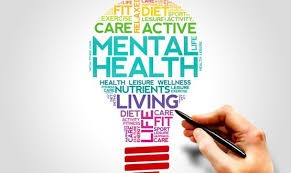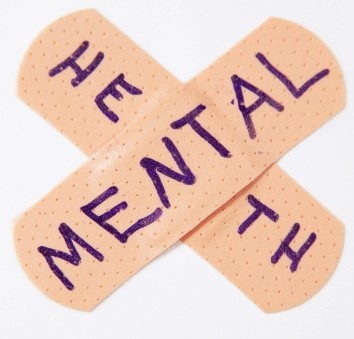Mental Health - Support for pupils
What is mental health?
We all have mental health, just as we all have physical health. Being mentally healthy means that:
 we feel good about ourselves;
we feel good about ourselves;- we can make and keep positive relationships with others;
- we feel able to manage our feelings rather than feeling overwhelmed by them;
- we have interests or hobbies that we enjoy;
- we feel hopeful and positive about the future.
Good mental health helps us to cope with life’s ups and downs and to ask for support from others when we need it.
Mental health spectrum
Mental health and mental illness are part of a scale or ‘spectrum’ just as physical health and illness are. Many things can lead us to move up and down the spectrum at different times of our life.
Examples of things that might harm our mental health are:
- having friendship difficulties such as lots of arguments;
- feeling under pressure at school, such as during exams;
- feeling worried about the health of a family member;
- being bullied – in person or online.
Some things that might protect and improve our mental health are:
- having a close friend you trust, or a supportive friendship group;
- having a teacher or other staff member at school you can go to if you need help;
- enjoying time at home with your family;
- having hobbies or interests you enjoy taking part in;
- eating a healthy diet and getting plenty of sleep.
It is important to remember that, just as our mental health can suffer during difficult times in our life, it can also recover.

Top Tips for how to look after your mental health
Day to day . . .
Connect
Make time each day to spend with your family
Visit a friend or family member who needs support or company
Speak to someone new today
Arrange a day out with friends you haven’t seen for a while
Call your friend instead of messaging
Go to a party or social event instead of staying at home
Be active
Try to use the stairs and not the lift
Walk or cycle to school
Offer to take a neighbour’s dog for a walk
Run round the park or use the outdoor gym/trim trail
Use an app to count your daily steps
Give to others
Offer to do the ironing every week and set a time limit
Ask your friend how they really are, then really listen to the answer
Say thank you with a smile
Offer to lend a hand if you see someone struggling
Volunteer with a local group
Arrange a treat for you and a friend or family member
Phone a relative as a surprise
Be aware
Take a different route to school Try out yoga or meditation
Pick a time each day to breathe deeply and be aware of your surroundings
Play a piece of music and put all your energy into listening
Turn off all your social media for 30 minutes a day
Visit a place where you can be still for a few moments
Keep learning
Visit a museum, gallery, or a place of interest
Learn how to fix your bike
Get a family member to show you how to cook a meal
Teach yourself the basics of another language
Learn to play a musical instrument
Start a new hobby or restart one you had before
Also, don’t forget to:
Eat a balanced diet
Eating regular meals and ensuring you don’t skip breakfast is just as important for your mental health as it is for our physical health. Ensure you eat 5 fruit and veg a day, avoid foods which are high in sugar and drink plenty of water or other non-sugary drinks.
Get plenty of sleep
Start preparing for bedtime at least an hour beforehand. Try and establish a regular bedtime routine such as having a relaxing bath or shower beforehand and ensuring your room is dark and not too hot or cold. Avoid any screen (TV, laptop, computer, phone) usage for an hour before bedtime as the light from the screen can keep your brain alert and not ready for sleep.
When times get tough . . .
Remember that it is normal to go up and down the spectrum of mental health at different times in our lives. Here are some things you can do to support yourself when things get tough:
Try writing down how you feel
Some young people find keep a ‘mood diary’ helpful to record how they feel on different days and identify any patterns which might explain what is upsetting them.
Reach out to others who are struggling
If you know that someone else in your friendship group is also finding things difficult, reach out to them and see if you can support each other. Helping someone else can help you feel better too.
Be kind to yourself
When times are hard, it’s important to be extra kind to yourself just as you would be kind to
a friend in need. Think about what you might find comforting – re-reading a favourite book, playing some favourite music, watching a film you enjoy with a friend or parent/carer, going for a walk to clear your head.
Speak to someone you trust
One of the most important things you can do is to speak to someone rather than ‘bottling up’ your feelings inside yourself. Choose a close friend, family member or a teacher or other school staff member to share your worries with
Ask for help
If you continue to struggle, and especially if you have any thoughts about hurting yourself, speak to a member of school staff or ask your parent/carer to book a GP appointment for you. If you don’t feel comfortable talking to someone directly, you can call the Samaritans on 116 123 or Childline on 0800 1111. Remember there shouldn’t be any shame in asking for help, in fact it’s a sign of courage.
Find out more. . .
Use the resources below to find out more about mental health and wellbeing:
The Mental Health Foundation website has a useful A-Z of key mental health topics: https://www.mentalhealth.org.uk/a-to-z
Young Minds provide useful information for young people and their parents about mental health, seeking treatment and the mental health system: https:// youngminds.org.uk
Childline have lots of advice about managing different feelings as well as their phoneline which is open 24 hours a day https://www.childline.org.uk/info-advice/ your-feelings/
Kooth provide counselling support both face to face and online https://kooth. com/
Mind have a whole range of information and support information for children and parents on their website: https://www.mind.org.uk/information-support/
